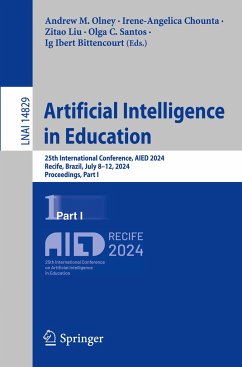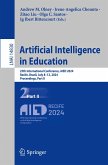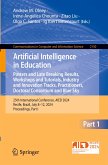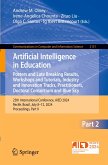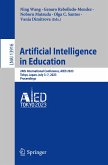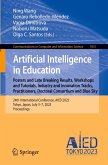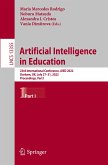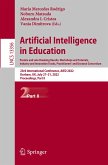Artificial Intelligence in Education
25th International Conference, AIED 2024, Recife, Brazil, July 8-12, 2024, Proceedings, Part I
Herausgegeben:Olney, Andrew M.; Chounta, Irene-Angelica; Liu, Zitao; Santos, Olga C.; Bittencourt, Ig Ibert
Artificial Intelligence in Education
25th International Conference, AIED 2024, Recife, Brazil, July 8-12, 2024, Proceedings, Part I
Herausgegeben:Olney, Andrew M.; Chounta, Irene-Angelica; Liu, Zitao; Santos, Olga C.; Bittencourt, Ig Ibert
- Broschiertes Buch
- Merkliste
- Auf die Merkliste
- Bewerten Bewerten
- Teilen
- Produkt teilen
- Produkterinnerung
- Produkterinnerung
This book constitutes the refereed proceedings of the 25th International Conference on Artificial Intelligence in Education, AIED 2024, held in Recife, Brazil, in July 8-12, 2024, Proceedings.
The 49 full papers and 27 short papers presented in this book were carefully reviewed and selected from 334 submissions. The papers present results in high-quality research on intelligent systems and the cognitive sciences for the improvement and advancement of education.
Andere Kunden interessierten sich auch für
![Artificial Intelligence in Education Artificial Intelligence in Education]() Artificial Intelligence in Education55,99 €
Artificial Intelligence in Education55,99 €![Artificial Intelligence in Education. Posters and Late Breaking Results, Workshops and Tutorials, Industry and Innovation Tracks, Practitioners, Doctoral Consortium and Blue Sky Artificial Intelligence in Education. Posters and Late Breaking Results, Workshops and Tutorials, Industry and Innovation Tracks, Practitioners, Doctoral Consortium and Blue Sky]() Artificial Intelligence in Education. Posters and Late Breaking Results, Workshops and Tutorials, Industry and Innovation Tracks, Practitioners, Doctoral Consortium and Blue Sky67,99 €
Artificial Intelligence in Education. Posters and Late Breaking Results, Workshops and Tutorials, Industry and Innovation Tracks, Practitioners, Doctoral Consortium and Blue Sky67,99 €![Artificial Intelligence in Education. Posters and Late Breaking Results, Workshops and Tutorials, Industry and Innovation Tracks, Practitioners, Doctoral Consortium and Blue Sky Artificial Intelligence in Education. Posters and Late Breaking Results, Workshops and Tutorials, Industry and Innovation Tracks, Practitioners, Doctoral Consortium and Blue Sky]() Artificial Intelligence in Education. Posters and Late Breaking Results, Workshops and Tutorials, Industry and Innovation Tracks, Practitioners, Doctoral Consortium and Blue Sky64,99 €
Artificial Intelligence in Education. Posters and Late Breaking Results, Workshops and Tutorials, Industry and Innovation Tracks, Practitioners, Doctoral Consortium and Blue Sky64,99 €![Artificial Intelligence in Education Artificial Intelligence in Education]() Artificial Intelligence in Education90,99 €
Artificial Intelligence in Education90,99 €![Artificial Intelligence in Education. Posters and Late Breaking Results, Workshops and Tutorials, Industry and Innovation Tracks, Practitioners, Doctoral Consortium and Blue Sky Artificial Intelligence in Education. Posters and Late Breaking Results, Workshops and Tutorials, Industry and Innovation Tracks, Practitioners, Doctoral Consortium and Blue Sky]() Artificial Intelligence in Education. Posters and Late Breaking Results, Workshops and Tutorials, Industry and Innovation Tracks, Practitioners, Doctoral Consortium and Blue Sky97,99 €
Artificial Intelligence in Education. Posters and Late Breaking Results, Workshops and Tutorials, Industry and Innovation Tracks, Practitioners, Doctoral Consortium and Blue Sky97,99 €![Artificial Intelligence in Education Artificial Intelligence in Education]() Artificial Intelligence in Education90,99 €
Artificial Intelligence in Education90,99 €![Artificial Intelligence in Education. Posters and Late Breaking Results, Workshops and Tutorials, Industry and Innovation Tracks, Practitioners¿ and Doctoral Consortium Artificial Intelligence in Education. Posters and Late Breaking Results, Workshops and Tutorials, Industry and Innovation Tracks, Practitioners¿ and Doctoral Consortium]() Artificial Intelligence in Education. Posters and Late Breaking Results, Workshops and Tutorials, Industry and Innovation Tracks, Practitioners¿ and Doctoral Consortium75,99 €
Artificial Intelligence in Education. Posters and Late Breaking Results, Workshops and Tutorials, Industry and Innovation Tracks, Practitioners¿ and Doctoral Consortium75,99 €-
-
-
This book constitutes the refereed proceedings of the 25th International Conference on Artificial Intelligence in Education, AIED 2024, held in Recife, Brazil, in July 8-12, 2024, Proceedings.
The 49 full papers and 27 short papers presented in this book were carefully reviewed and selected from 334 submissions. The papers present results in high-quality research on intelligent systems and the cognitive sciences for the improvement and advancement of education.
The 49 full papers and 27 short papers presented in this book were carefully reviewed and selected from 334 submissions. The papers present results in high-quality research on intelligent systems and the cognitive sciences for the improvement and advancement of education.
Produktdetails
- Produktdetails
- Lecture Notes in Computer Science 14829
- Verlag: Springer / Springer Nature Switzerland / Springer, Berlin
- Artikelnr. des Verlages: 978-3-031-64301-9
- 2024
- Seitenzahl: 536
- Erscheinungstermin: 2. Juli 2024
- Englisch
- Abmessung: 235mm x 155mm x 29mm
- Gewicht: 803g
- ISBN-13: 9783031643019
- ISBN-10: 3031643011
- Artikelnr.: 70747417
- Herstellerkennzeichnung Die Herstellerinformationen sind derzeit nicht verfügbar.
- Lecture Notes in Computer Science 14829
- Verlag: Springer / Springer Nature Switzerland / Springer, Berlin
- Artikelnr. des Verlages: 978-3-031-64301-9
- 2024
- Seitenzahl: 536
- Erscheinungstermin: 2. Juli 2024
- Englisch
- Abmessung: 235mm x 155mm x 29mm
- Gewicht: 803g
- ISBN-13: 9783031643019
- ISBN-10: 3031643011
- Artikelnr.: 70747417
- Herstellerkennzeichnung Die Herstellerinformationen sind derzeit nicht verfügbar.
.- From Learning Actions to Dynamics: Characterizing Students' Individual Temporal Behavior with Sequence Analysis.
.- Explainable Automatic Grading with Neural Additive Models.
.- PBChat: Enhance Student's Problem Behavior Diagnosis with Large Language Model.
.- Generating Situated Reflection Triggers About Alternative Solution Paths: A Case Study in Generative AI for Computer-Supported Collaborative Learning .
.- Automated Assessment of Encouragement and Warmth in Classrooms Leveraging Multimodal Emotional Features and ChatGPT.
.- Ruffle&Riley: Insights from Designing and Evaluating a Large Language Model-Based Conversational Tutoring System.
.- Knowledge Tracing Unplugged: From Data Collection to Model Deployment.
.- Grading Documentation with Machine Learning.
.- Supporting Teaching-to-the-Curriculum by Linking Diagnostic Tests to Curriculum Goals: Using Textbook Content as Context for Retrieval-Augmented Generation with Large Language Models.
.- VerAs: Verify then Assess STEM Lab Reports.
.- Evaluating the Effectiveness of Comparison Activities in a CTAT Tutor for Algorithmic Thinking.
.- Automated Long Answer Grading with RiceChem Dataset.
.- Knowledge Tracing as Language Processing: A Large-scale
Autoregressive Paradigm.
.- Can GPT4 Answer Educational Tests? Empirical Analysis of Answer Quality based on Question Complexity and Difficulty.
.- Understanding Gender Effects in Game-Based Learning: The Role of Self-Explanation.
.- Calcium regulation assignment: Alternative styles in successfully learning about biological mechanisms.
.- Who's helping who? When students use ChatGPT to engage in practice lab sessions.
.- Deep-IRT with a temporal convolutional network for reflecting students' long-term history of ability data.
.- How to Teach Programming in the AI Era? Using LLMs as a Teachable Agent for Debugging.
.- Improving the Validity of Automatically Generated Feedback via Reinforcement Learning.
.- Automatic Detection of Narrative Rhetorical Categories and Elements on Middle School Written Essays.
.- Marking: Visual Grading with Highlighting Errors and Annotating Missing Bits.
.- Jill Watson: A Virtual Teaching Assistant powered by ChatGPT.
.- Evaluating the Design Features of an Intelligent Tutoring System for Advanced Mathematics Learning.
.- Anticipating Student Abandonment and Failure: Predictive Models in High School Settings.
.- Beyond the Grey Area: Exploring the Effectiveness of Scaffolding as a Learning Measure.
.- Fairness of MOOC Completion Predictions Across Demographics and Contextual Variables.
.- EngageME: Exploring Neuropsychological Tests for Assessing Attention in Online Learning.
.- The Neglected 15%: Positive Effects of Hybrid Human-AI Tutoring Among Students with Disabilities.
.- Fine-tuning a Large Language Model with Reinforcement Learning for Educational Question Generation.
.- On Cultural Intelligence in LLM-based Chatbots: Implications for Artificial Intelligence in Education.
.- Leveraging Large Language Models for Automated Chinese Essay Scoring.
.- The Unexpected Effects of Google Smart Compose on Open-Ended Writing Tasks.
.- Teaching and Measuring Multidimensional Inquiry Skills using Interactive Simulations.
.- Explainable Automatic Grading with Neural Additive Models.
.- PBChat: Enhance Student's Problem Behavior Diagnosis with Large Language Model.
.- Generating Situated Reflection Triggers About Alternative Solution Paths: A Case Study in Generative AI for Computer-Supported Collaborative Learning .
.- Automated Assessment of Encouragement and Warmth in Classrooms Leveraging Multimodal Emotional Features and ChatGPT.
.- Ruffle&Riley: Insights from Designing and Evaluating a Large Language Model-Based Conversational Tutoring System.
.- Knowledge Tracing Unplugged: From Data Collection to Model Deployment.
.- Grading Documentation with Machine Learning.
.- Supporting Teaching-to-the-Curriculum by Linking Diagnostic Tests to Curriculum Goals: Using Textbook Content as Context for Retrieval-Augmented Generation with Large Language Models.
.- VerAs: Verify then Assess STEM Lab Reports.
.- Evaluating the Effectiveness of Comparison Activities in a CTAT Tutor for Algorithmic Thinking.
.- Automated Long Answer Grading with RiceChem Dataset.
.- Knowledge Tracing as Language Processing: A Large-scale
Autoregressive Paradigm.
.- Can GPT4 Answer Educational Tests? Empirical Analysis of Answer Quality based on Question Complexity and Difficulty.
.- Understanding Gender Effects in Game-Based Learning: The Role of Self-Explanation.
.- Calcium regulation assignment: Alternative styles in successfully learning about biological mechanisms.
.- Who's helping who? When students use ChatGPT to engage in practice lab sessions.
.- Deep-IRT with a temporal convolutional network for reflecting students' long-term history of ability data.
.- How to Teach Programming in the AI Era? Using LLMs as a Teachable Agent for Debugging.
.- Improving the Validity of Automatically Generated Feedback via Reinforcement Learning.
.- Automatic Detection of Narrative Rhetorical Categories and Elements on Middle School Written Essays.
.- Marking: Visual Grading with Highlighting Errors and Annotating Missing Bits.
.- Jill Watson: A Virtual Teaching Assistant powered by ChatGPT.
.- Evaluating the Design Features of an Intelligent Tutoring System for Advanced Mathematics Learning.
.- Anticipating Student Abandonment and Failure: Predictive Models in High School Settings.
.- Beyond the Grey Area: Exploring the Effectiveness of Scaffolding as a Learning Measure.
.- Fairness of MOOC Completion Predictions Across Demographics and Contextual Variables.
.- EngageME: Exploring Neuropsychological Tests for Assessing Attention in Online Learning.
.- The Neglected 15%: Positive Effects of Hybrid Human-AI Tutoring Among Students with Disabilities.
.- Fine-tuning a Large Language Model with Reinforcement Learning for Educational Question Generation.
.- On Cultural Intelligence in LLM-based Chatbots: Implications for Artificial Intelligence in Education.
.- Leveraging Large Language Models for Automated Chinese Essay Scoring.
.- The Unexpected Effects of Google Smart Compose on Open-Ended Writing Tasks.
.- Teaching and Measuring Multidimensional Inquiry Skills using Interactive Simulations.
.- From Learning Actions to Dynamics: Characterizing Students' Individual Temporal Behavior with Sequence Analysis.
.- Explainable Automatic Grading with Neural Additive Models.
.- PBChat: Enhance Student's Problem Behavior Diagnosis with Large Language Model.
.- Generating Situated Reflection Triggers About Alternative Solution Paths: A Case Study in Generative AI for Computer-Supported Collaborative Learning .
.- Automated Assessment of Encouragement and Warmth in Classrooms Leveraging Multimodal Emotional Features and ChatGPT.
.- Ruffle&Riley: Insights from Designing and Evaluating a Large Language Model-Based Conversational Tutoring System.
.- Knowledge Tracing Unplugged: From Data Collection to Model Deployment.
.- Grading Documentation with Machine Learning.
.- Supporting Teaching-to-the-Curriculum by Linking Diagnostic Tests to Curriculum Goals: Using Textbook Content as Context for Retrieval-Augmented Generation with Large Language Models.
.- VerAs: Verify then Assess STEM Lab Reports.
.- Evaluating the Effectiveness of Comparison Activities in a CTAT Tutor for Algorithmic Thinking.
.- Automated Long Answer Grading with RiceChem Dataset.
.- Knowledge Tracing as Language Processing: A Large-scale
Autoregressive Paradigm.
.- Can GPT4 Answer Educational Tests? Empirical Analysis of Answer Quality based on Question Complexity and Difficulty.
.- Understanding Gender Effects in Game-Based Learning: The Role of Self-Explanation.
.- Calcium regulation assignment: Alternative styles in successfully learning about biological mechanisms.
.- Who's helping who? When students use ChatGPT to engage in practice lab sessions.
.- Deep-IRT with a temporal convolutional network for reflecting students' long-term history of ability data.
.- How to Teach Programming in the AI Era? Using LLMs as a Teachable Agent for Debugging.
.- Improving the Validity of Automatically Generated Feedback via Reinforcement Learning.
.- Automatic Detection of Narrative Rhetorical Categories and Elements on Middle School Written Essays.
.- Marking: Visual Grading with Highlighting Errors and Annotating Missing Bits.
.- Jill Watson: A Virtual Teaching Assistant powered by ChatGPT.
.- Evaluating the Design Features of an Intelligent Tutoring System for Advanced Mathematics Learning.
.- Anticipating Student Abandonment and Failure: Predictive Models in High School Settings.
.- Beyond the Grey Area: Exploring the Effectiveness of Scaffolding as a Learning Measure.
.- Fairness of MOOC Completion Predictions Across Demographics and Contextual Variables.
.- EngageME: Exploring Neuropsychological Tests for Assessing Attention in Online Learning.
.- The Neglected 15%: Positive Effects of Hybrid Human-AI Tutoring Among Students with Disabilities.
.- Fine-tuning a Large Language Model with Reinforcement Learning for Educational Question Generation.
.- On Cultural Intelligence in LLM-based Chatbots: Implications for Artificial Intelligence in Education.
.- Leveraging Large Language Models for Automated Chinese Essay Scoring.
.- The Unexpected Effects of Google Smart Compose on Open-Ended Writing Tasks.
.- Teaching and Measuring Multidimensional Inquiry Skills using Interactive Simulations.
.- Explainable Automatic Grading with Neural Additive Models.
.- PBChat: Enhance Student's Problem Behavior Diagnosis with Large Language Model.
.- Generating Situated Reflection Triggers About Alternative Solution Paths: A Case Study in Generative AI for Computer-Supported Collaborative Learning .
.- Automated Assessment of Encouragement and Warmth in Classrooms Leveraging Multimodal Emotional Features and ChatGPT.
.- Ruffle&Riley: Insights from Designing and Evaluating a Large Language Model-Based Conversational Tutoring System.
.- Knowledge Tracing Unplugged: From Data Collection to Model Deployment.
.- Grading Documentation with Machine Learning.
.- Supporting Teaching-to-the-Curriculum by Linking Diagnostic Tests to Curriculum Goals: Using Textbook Content as Context for Retrieval-Augmented Generation with Large Language Models.
.- VerAs: Verify then Assess STEM Lab Reports.
.- Evaluating the Effectiveness of Comparison Activities in a CTAT Tutor for Algorithmic Thinking.
.- Automated Long Answer Grading with RiceChem Dataset.
.- Knowledge Tracing as Language Processing: A Large-scale
Autoregressive Paradigm.
.- Can GPT4 Answer Educational Tests? Empirical Analysis of Answer Quality based on Question Complexity and Difficulty.
.- Understanding Gender Effects in Game-Based Learning: The Role of Self-Explanation.
.- Calcium regulation assignment: Alternative styles in successfully learning about biological mechanisms.
.- Who's helping who? When students use ChatGPT to engage in practice lab sessions.
.- Deep-IRT with a temporal convolutional network for reflecting students' long-term history of ability data.
.- How to Teach Programming in the AI Era? Using LLMs as a Teachable Agent for Debugging.
.- Improving the Validity of Automatically Generated Feedback via Reinforcement Learning.
.- Automatic Detection of Narrative Rhetorical Categories and Elements on Middle School Written Essays.
.- Marking: Visual Grading with Highlighting Errors and Annotating Missing Bits.
.- Jill Watson: A Virtual Teaching Assistant powered by ChatGPT.
.- Evaluating the Design Features of an Intelligent Tutoring System for Advanced Mathematics Learning.
.- Anticipating Student Abandonment and Failure: Predictive Models in High School Settings.
.- Beyond the Grey Area: Exploring the Effectiveness of Scaffolding as a Learning Measure.
.- Fairness of MOOC Completion Predictions Across Demographics and Contextual Variables.
.- EngageME: Exploring Neuropsychological Tests for Assessing Attention in Online Learning.
.- The Neglected 15%: Positive Effects of Hybrid Human-AI Tutoring Among Students with Disabilities.
.- Fine-tuning a Large Language Model with Reinforcement Learning for Educational Question Generation.
.- On Cultural Intelligence in LLM-based Chatbots: Implications for Artificial Intelligence in Education.
.- Leveraging Large Language Models for Automated Chinese Essay Scoring.
.- The Unexpected Effects of Google Smart Compose on Open-Ended Writing Tasks.
.- Teaching and Measuring Multidimensional Inquiry Skills using Interactive Simulations.

